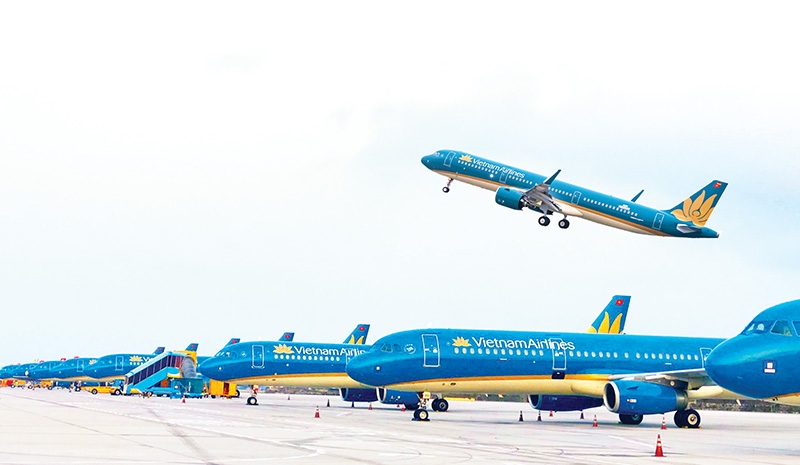Vietnam Airlines presses on with ambitions for US route
 |
| Vietnam Airlines presses on with ambitions for US route |
At last week’s webinar in Ho Chi Minh City focusing on US-Vietnam cooperation in Vietnamese airport infrastructure development, aviation authorities and more than 80 public and private sector representatives from both countries discussed opportunities and areas for collaboration as the two countries prepare for direct flights.
Groups involved at the event included Autodesk, Boeing, Collins Aerospace, Haskell, Honeywell, Mitre, Rapiscan, JBT Aerotech, Turner Construction, and Tyco Security.
The US-Vietnam Aviation Industry Group organised the event in an effort to partner Vietnam’s public and private sectors, expecting that the relationship will help Vietnam modernise and develop the country’s aviation infrastructure, while helping prepare for direct flights between the two countries and enhance safety and efficiency.
With the aim to contribute towards strengthening bilateral aviation ties, now US government agencies are working to provide a range of support and expertise, from technical assistance to financing support for planning and pilot projects.
Last month, Vietnam Airlines pushed forward with its dream of a direct commercial route to the US as a way to shelter from financial trouble amid the pandemic by proceeding with plans to begin regular direct flights to the states to serve the large repatriation needs of the Vietnamese community there, with a vision to operate commercial flights from 2022 onwards.
According to the Civil Aviation Authority of Vietnam, Vietnam Airlines has met most of the requirements of US authorities for the direct flight plan. The process is expected to be shortened to 3-4 months to complete the necessary procedures for the requirement from the Transportation Security Administration.
In the meantime, the national flag carrier has proposed increasing the ticket price ceiling by around $2-11 per passenger, while the floor price is suggested at 35 per cent of the ceiling, ranging from around $25 to $60, depending on the flight altitudes.
In addition, the carrier also proposed building a regulation in which the airline is granted with over 50 per cent of runway slots and commercial rights. It also wants to be the first air carrier allowed to resume international flights as a way to promote the national image, while seeking permission to carry out sale and leaseback for 50 per cent of aircraft.
While a representative of Vietnam Airlines said that the grounds for this proposal are the solutions for airlines to overcome difficulties caused by the pandemic and ease competition, it was immediately met with differing ideas from aviation experts.
They pointed out that in recent times, the competition among the six airlines of Vietnam Airlines, Vietjet, Bamboo, Pacific, Vietravel, and VASCO have enabled local people to access cheaper tickets.
Deputy Minister of Transport Le Tuan Anh said that any adjustments to ticket price limits should not break prevailing regulations in the Law on Competition and the Law on Prices, and must be reasonable with market conditions to ensure benefits for local consumers.
“At present, the Ministry of Transport (MoT) is working on the adjustment of some regulations in Circular No.19/2020/TT-BGTVT governing prices and service price frame at airports. The ministry’s opinion is to change towards diversifying products and services for passengers to enjoy,” he added.
To help Vietnam Airlines and others in the aviation industry ease the challenges they face, the MoT last week also proposed that the government reduces 70 per cent of road maintenance fees by end-2021 instead of by June 30; VAT to zero; and 50 per cent of corporate income tax for businesses in the hardship from COVID-19 impacts.
For aviation specifically, the MoT seeks government permission for continuation of 50 per cent reduction of landing and taking-off service prices for domestic flights, and application of a minimum price of zero for specialised aviation services as part of the list in which the state regulates the price frame by the end of 2021.
It also proposes not collecting parking fees at airports, and the State Bank of Vietnam to consider supporting policies on credits, loans, and payment terms.
In 2020, passenger transportation fell 35 per cent on-year due to the pandemic. Aviation was hardest hit, with drops of 43 and 15 per cent on-year in the number of passengers and cargo.
The aviation industry is now enjoying some supporting policies such as a cut of 30 per cent of special consumption tax on jet fuel, which was initiated in mid-2020 and last to the end of this year. Notably, Vietnam Airlines alone received a loan of nearly $174 million with a lending rate of zero.
What the stars mean:
★ Poor ★ ★ Promising ★★★ Good ★★★★ Very good ★★★★★ Exceptional
Related Contents
Latest News
More News
- State corporations poised to drive 2026 growth (February 03, 2026 | 13:58)
- Why high-tech talent will define Vietnam’s growth (February 02, 2026 | 10:47)
- FMCG resilience amid varying storms (February 02, 2026 | 10:00)
- Customs reforms strengthen business confidence, support trade growth (February 01, 2026 | 08:20)
- Vietnam and US to launch sixth trade negotiation round (January 30, 2026 | 15:19)
- Digital publishing emerges as key growth driver in Vietnam (January 30, 2026 | 10:59)
- EVN signs key contract for Tri An hydropower expansion (January 30, 2026 | 10:57)
- Vietnam to lead trade growth in ASEAN (January 29, 2026 | 15:08)
- Carlsberg Vietnam delivers Lunar New Year support in central region (January 28, 2026 | 17:19)
- TikTok penalised $35,000 in Vietnam for consumer protection violations (January 28, 2026 | 17:15)

 Tag:
Tag:




















 Mobile Version
Mobile Version